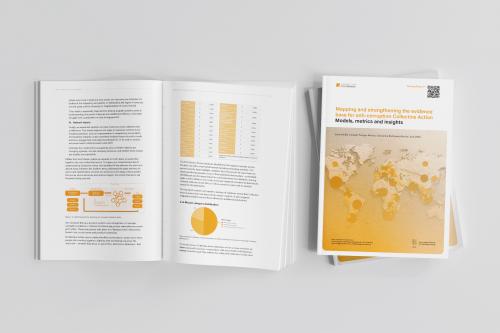Seedlings of hope: New report on promising efforts to address environmental corruption

Four years ago, States parties to the UN Convention Against Corruption (UNCAC) committed to a landmark resolution on Preventing and combating corruption as it relates to crimes that have an impact on the environment. Adopted at the 8th Conference of the States Parties to the UNCAC (CoSP 8), Resolution 8/12 urges States parties to prevent, investigate and prosecute corruption offences where they may be linked to crimes that have an impact on the environment.
What initiatives have taken place since then?
A new Working Paper prepared for the 10th CoSP – to take place in Atlanta, U.S. from 11–15 December 2023 – takes stock of initiatives in the last four years that align with Resolution 8/12. It presents a concise overview of prevention and enforcement actions, initiatives and measures implemented by UNCAC States parties between 2019 and 2023 to address corruption that impacts the environment. It also underscores the valuable contributions made by non-state actors, in particular civil society, academia and the media in this collective endeavour.
The report was prepared by independent expert Sophie Lemaître with the help of research assistant Nadia Fausta Azhara. It was funded by Liechtenstein as part of the Principality's ongoing support for our Green Corruption programme. It will be distributed at the CoSP and at a series of special events on environmental corruption that are open for live streaming.
Here are the main takeaways, but we urge you to read the full Working Paper for live examples and further details:
Corruption prevention measures
States have implemented initiatives to strengthen integrity through corruption perception surveys, the revision of policies, the establishment of corruption prevention committees and the organisation of ethical and integrity workshops.
Whistleblower protection programmes are also being created and corruption risk assessments conducted in sectors such as wildlife management, forestry and fisheries.
Promising corruption prevention interventions include:
- Conducting regular corruption perception and experience surveys among staff can help assess both progress and the effectiveness of corruption prevention measures.
- Involving high-level management and leadership at each stage of the corruption prevention approach can help develop ownership and accountability.
- Stipulating a mandatory budget for corruption prevention across ministries, agencies and departments can help ensure a minimal investment in integrity and anti-corruption activities are effectively prioritised and implemented.
- Platforms for government representatives from different countries to exchange on corruption prevention actions can help identify and learn from successes and challenges.
Enforcement actions
Several countries have investigated and prosecuted corruption cases linked to crimes that have an impact on the environment. Financial investigations and money laundering legislation are also being used to address the relationship between corruption and crimes that have an impact on the environment.
The systematic seizure and confiscation of assets is only just beginning, as is the creation of multi-agency and inter-disciplinary task forces, nationally and internationally.
Promising enforcement interventions include:
- Assessing the economic, social and environmental losses from cases of corruption linked to crimes that have an impact on the environment – and using these to calculate associated penalties and fines – can help compensate and restore some of the harm done.
- Seizing and confiscating proceeds and instrumentalities of crime (bank accounts, real estate, vehicles, art, jewellery, etc.) can help ensure that crime does not pay. It also removes the resources needed to continue activities that harm the environment.
- Exploring legal avenues outside the anti-corruption field can help strengthen enforcement. These include money laundering and tax offences as well as corporate due diligence legislation, remedies via civil proceedings and Environmental, Social and Governance (ESG) considerations to expose greenwashing.
Essential role of civil society and the media
Alongside States, civil society and the media have played an essential role in increasing our understanding of the relationship between corruption and crimes that have an impact on the environment.
Their efforts span investigative reporting, publishing evidence-based research, capacity building and creating networks to bridge the gap between anti-corruption and environmental practitioners.
Environmental corruption goes beyond crimes that have an impact on the environment
Focusing solely on corruption linked to crimes that have an impact on the environment overlooks situations where corruption causes environmental harm without an associated environmental offence. For example, a bribe to obtain a land conversion permit may result in apparently legal deforestation and biodiversity loss.
A holistic approach to looking at “environmental corruption” – meaning corruption that impacts the environment in any way, not only corruption linked to crimes that have an impact on the environment – is crucial for protecting the environment and people.
The way forward
As the report highlights, a plethora of activities are taking place to tackle corruption that impacts the environment. The paper picks out those that show significant promise.
This diversity of engagements is laudable. But it is far from the scale needed to make a systemic difference to both our societal corruption and environmental challenges. States parties need to test and scale up initiatives that are effective or look promising, by, among other things:
- Making efforts to assess and understand their country’s risks of corruption as it relates to the environment.
- Ensuring more robust staffing and prioritisation of corruption prevention systems in government and state-owned enterprises tasked with conserving, managing or trading natural resources.
- Developing specialised knowledge and expertise of governmental institutions and agencies to better address corruption that impacts the environment.
- Incorporating anti-corruption measures into environmental and natural resource policies and strengthening environmental governance structures to include anti-corruption internal controls and mechanisms.
- Dedicating greater resources for specialised law enforcement to pursue complex financial flows linked to corruption and crimes that have an impact on the environment.
- Increasing inter-agency collaboration and conducting joint operations on environmental corruption.
- Making use of legal frameworks and testing new legal avenues to hold individuals and natural persons accountable, including through asset recovery and remedies to repair the damage.
- Gathering evidence on corruption that affects the environment.
- Engaging in platforms for representatives from governments, civil society and other stakeholder groups to exchange experiences and know-how in tackling corruption that impacts the environment.
- Ensuring that this issue is integrated in all relevant United Nations processes such as the ones related to climate and biodiversity.
Protecting civil society space, in particular journalists and human rights defenders working on the environment and corruption-related issues, is vital to tackle environmental corruption.
Learn more
- View and download Working Paper 50: Seedlings of hope: Addressing corruption linked to crimes that impact the environment in line with UNCAC Resolution 8/12
- View and register for the environmental corruption events at the CoSP
- Learn more about our Green Corruption programme



